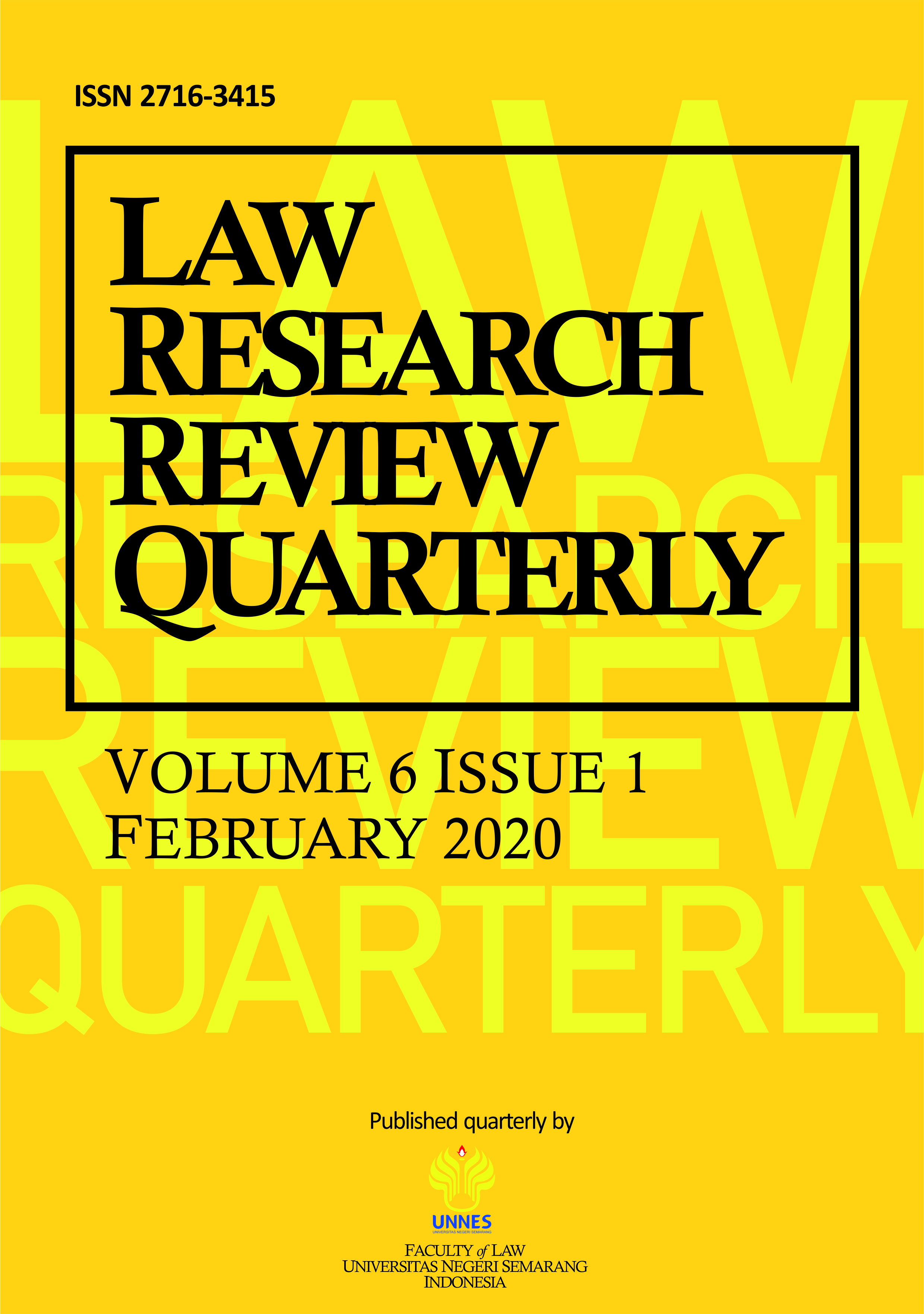The Islamic Taste in Laws and Regulations Establishment: Case of Gorontalo Province, Indonesia
Main Article Content
Abstract
The presence of a local regulation containing religious teachings has recently been challenged in the form of criticism, which considers that the existence of this regulation product is a form of discrimination and is not effectively implemented. The results of the study, Gorontalo Province, dubbed "Serambi Madinah", the majority of the population is Muslim, putting religion as the main thing in the affairs of life. The urgency of the teachings of Islam in the formation of legal products in Gorontalo is based on several things, in addition to being considered a local wisdom, the law instead presents justice, prosperity and prosperity for its people and serves as a benchmark for how to live a national life based on Pancasila without violating the value of tolerance towards other people. Local regulations based on religious teachings also contain solutions to overcoming the problems of poverty, economic, social and cultural areas that originate from the Qur'an where the teachings are for the salvation of humanity from moral damage. Therefore, it is important to present regulations containing the content of Islamic teachings as a form of preventive and repressive measures for all forms of crime and deviant behavior. Islamic teachings are considered important to be the substance, in addition to supporting parents to provide assistance to children's activities, it also supports the government in carrying out its duties and responsibilities in social affairs.
Article Details
All writings published in this journal are personal views of the authors and do not represent the views of this journal and the author's affiliated institutions. Author(s) are retain the copyrights of the Article. However, before publishing, it is required to obtain written confirmation from Author(s) in order to ensure the originality (Author Statement of Originality). The statement is to be signed by at least one of the authors who have obtained the assent of the co-author(s) where applicable.This work licensed under a Creative Commons Attribution-ShareAlike 4.0 International (CC BY-SA 4.0)
References
Arifin, R. (2017). Democracy on Indonesian Legal Reform: How Can People Participate on Laws and Regulations Establishment Process. JILS (Journal of Indonesian Legal Studies), 2(02), 155-158. https://doi.org/10.15294/jils.v2i02.19439.
Arifin, R., Alkadri, R., Sari, D. P., Resthiningsih, L., & Holish, A. M. (2019). Improving Law Student Ability on Legal Writing through Critical and Logical Thinking by IRAC Method. Indonesian Journal of Advocacy and Legal Services, 1(1), 107-128. https://doi.org/10.15294/ijals.v1i1.33706.
Arifin, R. (2020). Legal Services and Advocacy in the Industrial Revolution 4.0: Challenges and Problems in Indonesia. Indonesian Journal of Advocacy and Legal Services, 1(2), 159-162. https://doi.org/10.15294/ijals.v1i2.36488.
Arifin, R., Waspiah, W., & Latiafiani, D. (2018). Penulisan Karya Ilmiah untuk Mahasiswa Hukum. Semarang: BPFH UNNES.
Bhaskara, I.L.A. (2018). Kontroversi Perda Syariah: Dinilai Diskriminatif dan Dipolitisir. Tirto Online 22 November, https://tirto.id/kontroversi-perda-syariah-dinilai-diskriminatif-dan-dipolitisir-dalS.
Dwiastono, R. (2019). Perda syariah di Indonesia: antara kearifan lokal, politik elektoral dan ancaman terhadap kebhinekaan, BBC, 15 August, https://www.bbc.com/indonesia/indonesia-49332135.
Hafizhah, h., & Nashrullah, n. (2018). Sisi Negatif Perda Syariah Menurut Luthfi Assyaukanie, Republika, 16 November, https://www.republika.co.id/berita/nasional/politik/18/11/16/piacp0320-sisi-negatif-perda-syariah-menurut-luthfi-assyaukanie.
Harmaji, H. (2018). Tackling Terrorism, an Indonesian Style on Penal and Non-Penal Policy Perspective: A Book Review Gaya Indonesia Menghadang Terrorisme, Ali Masyhar. JILS (Journal of Indonesian Legal Studies), 3(01), 147-150. https://doi.org/10.15294/jils.v3i01.23214.
Harahap, R. D. (2016). LGBT di Indonesia: Perspektif hukum Islam, HAM, psikologi dan pendekatan maṣlaḥah. Al-Ahkam, 26(2), 223-248.
Kosciw, J. G., Bartkiewicz, M., & Greytak, E. A. (2012). Promising strategies for prevention of the bullying of lesbian, gay, bisexual, and transgender youth. The Prevention Researcher, 19(3), 10-14.
Manan, B, (1995). Sistem dan Teknik Pembuatan Peraturan Perundang-undangan Tingkat Daerah. Bandung: Pusat Penerbitan Universitas LPPM, Universitas Islam Bandung.
Manan, A. (2006). Reformasi Hukum Islam di Indonesia,. Jakarta: PT. Rajagrafindo Persada.
Masyhar, A., Arifin, R., & Fuad, A. N. (2018). Urgensi Penyusunan dan Penerapan Kurikulum Antiradikalisme Sejak Dini. SNKPPM, 1(1), 87-89. https://proceeding.unnes.ac.id/index.php/snkppm/article/view/177.
Masyhar, A., Rasdi, R., & Harmoko, F. S. (2019). Peran Khutbah Jum’at dalam Mengantisipasi Radikalisme Beragama. Jurnal Pengabdian Hukum Indonesia (Indonesian Journal of Legal Community Engagement) JPHI, 1(2), 178-183. https://journal.unnes.ac.id/sju/index.php/JPHI/article/view/28578.
Mustofa, K. (2017). Sumber Ajaran Islam Sunnah dan Ijtihad. Padang: Universits Negeri Padang.
Nawi, S. (2013). Penelitian Hukum Normatif versus Penelitian Hukum Empiris. Makassar: PT. Umitoha Ukhuwah Grafika.
Niravita, A. (2020). Social Injustice in the Industrial Revolution 4.0. Indonesian Journal of Advocacy and Legal Services, 1(2), 163-168. https://doi.org/10.15294/ijals.v1i2.36509.
Prasetiyo, N. A., & Perwiraningtyas, P. (2017). The Development of Teaching Material for Sexual Education as an Effort to Prevent LGBT, Sexual Abuse, and Free Sex For Junior High School Students. Bioeducation Journal, 1(2), 1-9.
Soerjono. S. (2007). Pengantar Penelitian Hukum. Jakarta: UI-Press.
Syaifudiin, A. (2000). Ushul Fiqih. Jakarta: Logos Wacana Ilmu.
Syafrudin, A. (1985). Pasang Surut Otonomi Daerah. Bandung: Binacipta.
Syamsudin, A. (2013). Proses dan Teknik Penyusunan Undang-Undang. Jakarta: Sinar Grafika.
